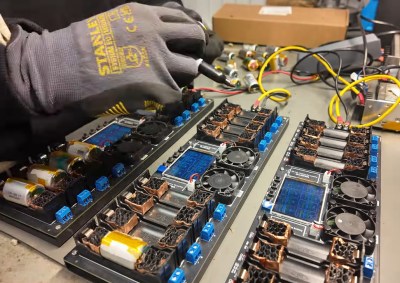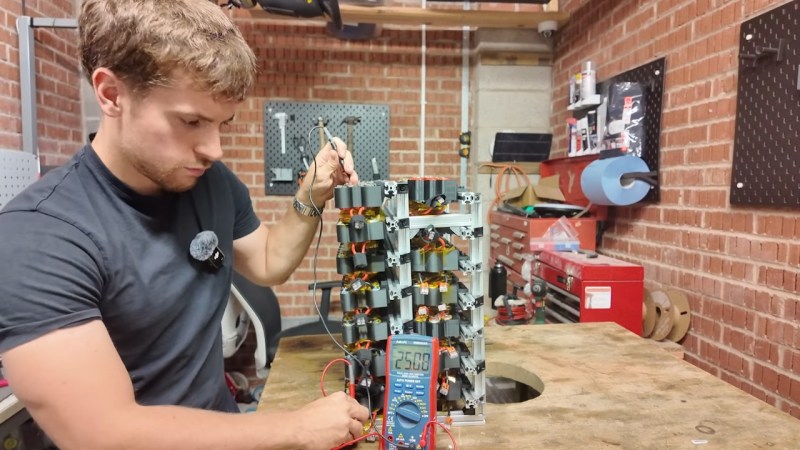Economists have this idea that we live in an efficient market, but it’s hard to fathom that when disposable vapes are equipped with rechargeable lithium cells. Still, just as market economists point out that if you leave a dollar on the sidewalk someone will pick it up, if you leave dollars worth of lithium batteries on the sidewalk, [Chris Doel] will pick them up and build a DIY home battery bank that we really hope won’t burn down his shop.

The Powerwall-like arrangement uses 500 batteries salvaged from disposable vapes. His personal quality control measure while pulling the cells from the vapes was to skip any that had been discharged past 3 V. On the other hand, we’d be conservative too if we had to live with this thing, solid brick construction or not.
That quality control was accomplished by a clever hack in and of itself: he built a device to blow through the found vapes and see if they lit up. (That starts at 3:20 in the vid.) No light? Not enough voltage. Easy. Even if you’re not building a hoe powerbank, you might take note of that hack if you’re interested in harvesting other people’s deathsticks for lithium cells. The secret ingredient was the pump from a CPAP machine. Actually, it was the only ingredient.)
In another nod to safety, he fuses every battery and the links between the 3D printed OSHA unapproved packs. The juxtoposition between janky build and careful design nods makes this hack delightful, and we really hope [Chris] doesn’t burn down his shed, because like the cut of his jib and hope to see more hacks from this lad. They likely won’t involve nicotine-soaked lithium, however, as the UK is finally banning disposable vapes.
In some ways, that’s a pity, since they’re apparently good for more than just batteries — you can host a website on some of these things. How’s that for market efficiency?
















I hope the “hoe powerbank” typo won’t be fixed as it’s funny :~)
Youngsters around me really gotta up their smoking game if i wanna have any chance at getting free lithium cells.
Great project, really quite labour intensive but the results are also very good
Pretty sure we’ve already banned disposable vapes here in the UK and the ones I’ve seen with the ARM chip are usually refillable as well as rechargeable.
We have indeed, though apparently vape-junkies stockpiled them before the ban.
But the ban has basically just resulted in the disposable vapes gaining usb ports, and they’re still just as disposable, so I’d expect toxic-chemical-soaked c-grade lithium batteries from “reusable” vapes will be just as commonly discarded on our streets.
The rechargeable port just meant they could make the battery smaller. Yay capitalism!
Banned in Australia as well (you can still buy them at pharmacies though), I haven’t found one for ages.
That’s what they did here in the states I think, I didn’t pay much attention at the time but I noticed the stick style device that’s still so common in the EU disappeared. Anything you see now has a charging port. The result was just a change in design to be bigger so the sponge part could hold more juice so devices are longer lasting but more expensive.
You can still use the batteries, but the most popular brand where I live is now incredibly difficult to get appart. After 30 minutes of trying and failing to get one apart with pliers I finally gave up and very carefuly cut one all around with di cutters so I could confirm where the battery is. Now that I know I’ve just been cutting them in half on the side without the battery with a Dremel.
Saved a bundle on the dinky batteries, and spent a small fortune on the electronics to support each individual cell. Seems like false economy.
This is Hackaday, since when does something need to be practical to be featured here?
I doubt he spent much on anything other than solder. There isn’t anything in his build that I couldn’t find in random garbages walking down the street on trash day.
Hell, just looking over at my ‘discarded electronics pile that I mine for project parts’ I can find an old CPAP machine and two nebulizers that would do the job of puff testing just fine and all the other various bits could easily be mined from that pile. (It’s a really big pile that takes up several book cases, bins and about an entire garage bay but I mine and build enough from it that my wife happily ignores it)
All of my robo-hoes use vape power banks.
It is an efficient market, but by what metric?
It’s called neoliberalism, which combines the idea of social justice and intervention by the state through economic policy alone, to the invisible hand of the market through defining value to be money and worth to be whatever anyone is willing to pay. A perfect mix of left and right wing idealism.
A vape is not an asset, it’s a consumable. So efficient markets do not apply.
A lithium ion battery is very much an asset, and in an efficient market wouldn’t find itself in a consumable.
It is not an asset to a person who is counting just the money they make from buying and selling vape pens. Once used, they would rather see it discarded so they can sell you another vape pen.
That’s incredibly short sighted and incredibly bad financial sense. A smart business person would want a refundable deposit on recyclable hardware that can only be redeemed when buying a new vape (just like propane tanks in the US) and they would make that hardware refillable so it would cost less than manufacturing it so they have higher margins AMD forced return business. Bonus points for making the hardware entirely proprietary and patenting it so you can add a revenue stream from lawsuits.
@george
Taking and returning deposits, collecting used vapes, extracting reusable components, and manufacturing new vapes from the parts is a hugely convoluted multstep multiparty operation requiring layers of infrastructure that arent mandated and do not provide any significant financial incentive.
Reusing a second hand disposable vape wouldnt merely be a matter of refilling it and reselling it. That would open you up to potential lawsuits galore from all of the potential disease transmission of sucking strangers slobber, which would kill your proposed bonus points from patent lawsuits which are quite frequently more expensive than lucrative. Its pretty tough to collect from foreign LLCs that fold and reform with the next family member on the tree as officer and a new name as soon as any judgement is made.
@NaH, collecting used vapes doesn’t provide any financial incentive to the maker because trash collection is an externalized cost that society picks up, but as we all know, they do that poorly. If products were required to price in the full lifecycle cost of what they make, including disposal, the incentives would align and we wouldn’t see so many bizarre and wasteful products.
As an autistic person this is funny and relatable. But you could have mentioned factorio
There are some tools to find inefficiences in the markets, I use some smart money concepts and technical analisis everyday. But even if you find them,they not always translates into profit.
Some inefficiencies always exist in absolute terms, and they have to be contrasted by the counter-factual case and its inefficiency.
Recycling batteries is a good example: how much does it cost to make a new one versus recovering, sorting, and re-using old ones?
Presently, it costs more to recycle a battery than make a new one, and that additional cost demands more economic activity to pay for, which results in more energy demand than simply making a new battery – assuming you don’t give up on performing other activities to account for your effort to recycle batteries.
Well coal tailings use to be considered just a waste much like vape batteries. And now they’re a potential source of lithium. Global politics can do that to a market.
https://www.mdpi.com/2075-163X/14/8/849
IMHO, right now we are (in the US) are stuck in the market that copied the worst of both worlds. State is no longer capable of good solid “interventions” in form of New Deals, whereas the invisible hand of the market had long (since early 1990s) reversed the trickle-down economy.
A perfect mix of what we don’t need, every sufficiently large corporations is no longer distinguished from mafia.
Apparently I’m living in the wrong part of the country. I have no idea where I would find discarded vapes. Folks are either not littering, not smoking, or at least not smoking tobacco.
I casually look for vapes while biking. I’ve found a few vapes on the side of the road. People just toss them out the car window! It occurred to me to look for a place where people who make poor life-choices congregate. High schools came to mind and I was correct. Typically near a stadium, parking lot or a place where kids hung out. Since this was my old high school, I remembered where these areas were. I have collected over a dozen now. That’s not enough for this project, but I have used a few cells in small projects and made use of the charging circuitry that some come with. If I were going to recreate this project, I would go to a reseller like Battery Hookup to get larger (and better) cells.
Walmart, Target, any major retailer in a strip mall type environment is a good place to look as well roadside like you said. “Discount smoke shops” are another good place to look.
Im in the US so use that as you will
Cool project. I will also leave this here since it’s similar in nature : https://github.com/dalathegreat/Battery-Emulator
I see maybe one or two persons a year who are vaping. I’ve never seen a discarded one on the street.
Seems to be a popular pastime in the UK though, vaping as well as discarding.
I think that if you want to power your home you should definitely NOT use Li-ion but go for lifepo4 or even sodium or something, not Lion though. Even when you are sane enough to attach them to the outside of the house in a cabinet attached to a stone wall instead of inside.
Ugh can we stop with the senseless vape fearmongering?
Scaring people with smoke and mirrors, the irony eh.
The tragedy here isn’t the tech being thrown into the landfill, it’s the lack of skilled individuals to make use of this discarded tech. When we shipped our jobs, we shipped our knowledge away.
That just tells you that people only want to learn if it’s necessary for work. Pretty sad. Also why they can’t find new jobs.
Make sure you include the follow up story where it burns his house to the ground!